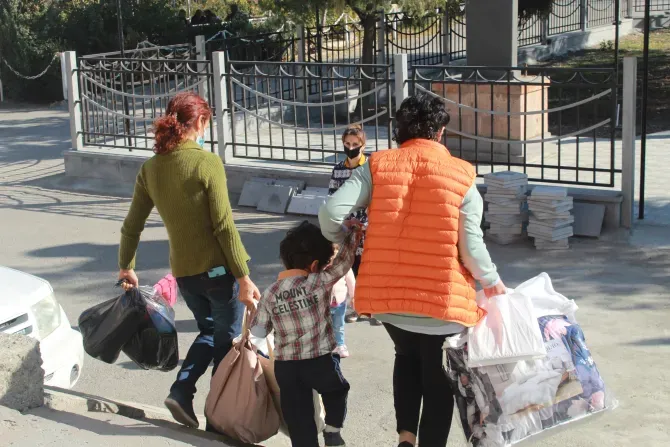Despite these promises, widespread fears of religious and cultural persecution have led large swathes of the population to flee to Armenia proper.
Mass exodus begins
Eric Hacopian, a human rights advocate who has been on the ground in Nagorno-Karabakh, told CNA that Armenians in the region are facing “horrendous” conditions in which they have “little food” and “no medicine or security.”
Hacopian called the Azeri actions in Nagorno-Karabakh “genocide” and said that by tomorrow he expects the number of refugees to rise to 15,000 to 20,000.
Ultimately he believes “95% to 99%” of the Armenian population in the region will flee because of the “risk of being murdered and tortured.”
(Story continues below)
Photos posted on social media showed the highways leading out of the region’s largest city, Stepanakert, filled with massive lines of cars filled with refugees.
Many of the Armenians in Nagorno-Karabakh have called the region home for centuries. Now, all of that appears to be rapidly changing.
“Armenians cannot survive under Turkish or Azeri rule,” Nash-Marshall told CNA Monday, adding that the Azeri government “thrives on Armenophobia.”
She said that deeply rooted anti-Armenian sentiment in Azeri culture is exhibited by the military’s executions of Armenian prisoners of war in 2022 as well as recently erected memorials in the Azeri capital city, Baku, that depict “grossly exaggerated life-sized figures of dead and dying Armenian soldiers and chained captives.”
“Anyone who knows the history of the Armenian Genocide will recognize the pattern of Azerbaijan’s actions with respect to Eastern Armenians and the Artsakhtsi,” Nash-Marshall said.
According to Gegham Stepanyan, an Artsakh human rights defender, “thousands” more displaced ethnic Armenians “are now waiting for their evacuation to Armenia.”
“Many of them,” Stepanyan said, “simply have nowhere to stay, so they have to wait for their turn in the streets.”
Armenia in danger
Some experts believe that Armenia itself is in danger of invasion.
Both Azerbaijan President Aliyev and Turkish President Recep Tayyip Erdogan have proposed constructing a highway in the far southern portion of the Armenian province of Syunik, which is bordered by Azerbaijan both to the east and the west.
The road would connect the main portion of Azerbaijan to both its western enclave, known as Nakhchivan, as well as to Turkey.
If built, experts fear Azerbaijan could soon move to wrest control of all of Syunik.
“Let us be realistic,” Nash-Marshall said. “Azerbaijan already has grabbed a part of the region … They are also firing on border villages and have been for a year. What, then, is the threat to Armenia? Invasion.”
Aliyev and Erdogan met in Nakhchivan on Monday, further increasing fears that the pair could be eyeing a Syunik takeover.
In a Monday press conference, Aliyev lamented that “the land link between the main part of Azerbaijan and Nakhchivan” was “cut off” when Soviet authorities assigned Syunik to Armenia instead of Azerbaijan, according to reporting by Reuters.
Hacopian also said that he believes an invasion of Armenia is “quite likely” to create a highway in what is currently southern Armenia.
U.S. response
Samantha Power, chief administrator for the U.S. Agency for International Development (USAID), and Assistant Secretary of State Yuri Kim landed in Armenia Monday.
In a Monday X post, Power said: “I’m here to reiterate the U.S.’s strong support & partnership with Armenia and to speak directly with those impacted by the humanitarian crisis in Nagorno-Karabakh.”
Many still feel that the U.S. is not doing enough to address the situation unfolding in Nagorno-Karabakh.
New Jersey Republican Rep. Chris Smith introduced a bill Friday to require the U.S. State Department to take concrete actions to guarantee the human rights of the Armenian Christians in Nagorno-Karabakh.
Titled the “Preventing Ethnic Cleansing and Atrocities in Nagorno-Karabakh Act of 2023,” the bill is co-sponsored by California Democrat Rep. Brad Sherman and Arkansas Republican Rep. French Hill.
If passed, the bill would require the U.S. government to take several actions in support of the impacted Armenians including terminating military aid to Azerbaijan and establishing military financing for Armenia, authorizing humanitarian assistance to Armenians in Nagorno-Karabakh and dispatching diplomats to the region to monitor the situation and immediately report any further human rights abuses.
“The people of Nagorno-Karabakh are in grave danger,” Smith said in a Monday press release. “Tragically, they have been forced to disarm and surrender their independence to a ruthless dictator whose government has repeatedly committed horrific abuses against them over many years, expressed its will to ethnically cleanse them, and even initiated a genocide by starvation with the blockade of the Lachin Corridor.”
Smith went on to say that “we must work with them to ensure that the transition is not marked by continued human atrocities.”








